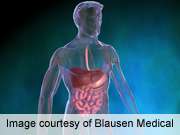Role of innervation explored in gastric tumorigenesis

(HealthDay)—Vagal innervation is involved in gastric tumorigenesis, according to an experimental study published in the Aug. 20 issue of Science Translational Medicine.
Chun-Mei Zhao, Ph.D., from the Norwegian University of Science and Technology in Trondheim, and colleagues examined the role of innervation in gastric tumorigenesis using mouse models.
The researchers found that surgical or pharmacological denervation of the stomach correlated with a marked reduction in tumor incidence and progression in three separate mouse models of gastric cancer, but only in the denervated portion of the stomach. The therapeutic effects of systemic chemotherapy were enhanced by vagotomy or botulinum toxin type A treatment, which also prolonged survival. Inhibition of Wnt-signaling and suppression of stem cell expansion were seen in association with denervation-induced suppression of tumorigenesis. In gastric organoid cultures, growth was stimulated by neurons in a Wnt-mediated manner via cholinergic signaling. Gastric tumorigenesis was suppressed by pharmacological inhibition or genetic knockout of the muscarinic acetylcholine M3 receptor. Tumor stage correlated with neural density and activated Wnt signaling in gastric cancer patients, while the risk of gastric cancer was reduced with vagotomy.
"Together, our findings suggest that vagal innervation contributes to gastric tumorigenesis via M3 receptor-mediated Wnt signaling in the stem cells, and that denervation might represent a feasible strategy for the control of gastric cancer," the authors write.
More information:
Abstract
Full Text (subscription or payment may be required)
Copyright © 2014 HealthDay. All rights reserved.















